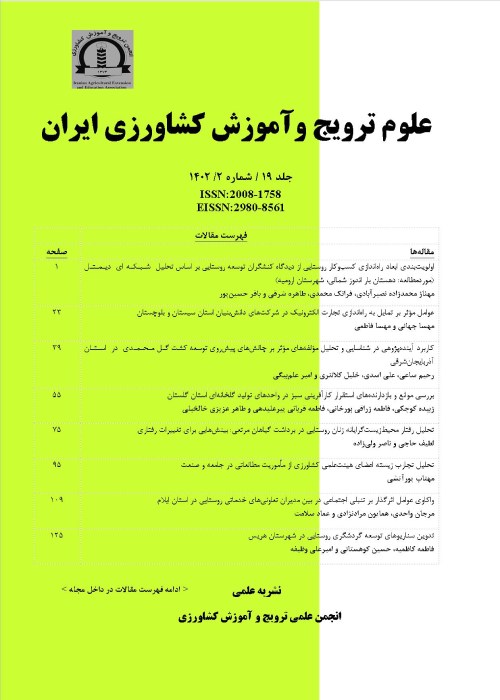Explaining of Scenarios, Strategies, and Policies of Meta-cognition Theory Institunalization in Agricultural Higher Education
Psychologists believe that the lack of attention to implementation of the meta-cognition in higher education centersin general and agricultural higher education in particular is one of the important factors that leads to lack of skill in students. Therfore, present study was carried out using a qualitative method with the pourose of explaining scenarios, strategies, and policies for institutionalization of meta-cognition theory in agricultural higher education. Requaired data were collected from meta-cognition experts who were selected using snowball sampling method. The SWOT techniqe was employed to analyze the data. At the first step, 15 interviews with the experts of meta-cognition theory in agricultural and educational majors were carrid out. The purpose of these interviews was to identify the strengths, weaknesses, opportunites, and threats existing in agricultural higher education. At the second step, the identifical item for strength, weaknesses, opprotunities, and threats were given to a panel of experts in order to determine the importance and present situation of each item. Accordingly, the face validity of research tool was confirmed by faculty members and Alpha coefficient values were at acceptable level. According to the point of view of participants, the most important strenghths of agricutural higher education system were including its ability to train human resources with high creativity, critical thinking, innovative, and thoughtfulness. The most significant weakness of the system was lack of stimulus and facilities. Furthemore, instruction for implementing meta-cognition theory (by faculty members) and lack of previous evidences about employing meta-cognition theory in higher education were the most prominent opportunity and threat of agricultural higher education system, respectively. The result revealed that weaknesses in internal matrix and threats in external matrix were more salient and thus, defensive strategy for institutionalization of meta-cognition theory in agricultural higher education have priority over other strategies. Bsed on defensive strategy,some policy implications were highlighted. At the end, experts were asked to employ these policy implications in identification of policies and solutions for institutionalization of meta-cognition theory. Presented solutions as the practical recommendations can be used by educational managers of agricultural colleges. By doing so, the level of information, intelligence, and meta-cognition skills of faculty members will be increased.
- حق عضویت دریافتی صرف حمایت از نشریات عضو و نگهداری، تکمیل و توسعه مگیران میشود.
- پرداخت حق اشتراک و دانلود مقالات اجازه بازنشر آن در سایر رسانههای چاپی و دیجیتال را به کاربر نمیدهد.



